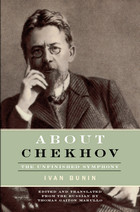
In About Chekhov Ivan Bunin sought to free the writer from limiting political, social, and aesthetic assessments of his life and work, and to present both in a more genuine, insightful, and personal way. Editor and translator Thomas Gaiton Marullo subtitles About Chekhov "The Unfinished Symphony," because although Bunin did not complete the work before his death in 1953, he nonetheless fashioned his memoir as a moving orchestral work on the writers' existence and art. . . . "Even in its unfinished state, About Chekhov stands not only as a stirring testament of one writer's respect and affection for another, but also as a living memorial to two highly creative artists." Bunin draws on his intimate knowledge of Chekhov to depict the writer at work, in love, and in relation with such writers as Tolstoy and Gorky. Through anecdotes and observations, spirited exchanges and reflections, this memoir draws a unique portrait that plumbs the depths and complexities of two of Russia's greatest writers.
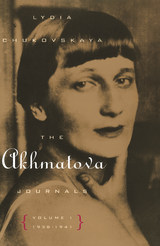
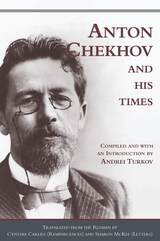
This anthology comprises reminiscences by a number of Anton Pavlovich Chekhov’s contemporaries, including the artist Konstantin Korovin, the writer Maxim Gorky, and Chekhov’s wife, Olga Knipper-Chekhova, and numerous letters written by Chekhov to his fellow writers and artists, family, publishers, and others.
Now available for the first time in English in America, these sixty-eight letters and ten essay-length reminiscences trace the development of Chekhov’s personality and talent, opening a window into the life and times of one of the world’s greatest short-story writers and playwrights. These perspectives on his family life and marriage, his early works, the stage productions of his plays, his literary successes, and the philosophies behind his writing create a rich biography of Chekhov that will reward writers, scholars, and all lovers of literature.
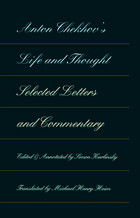

This comprehensive study of the Russian literary travelogue, a genre that blossomed in the early nineteenth century, sheds new light on Russian literature and culture of the period.
In the decades before and during the rise of the Russian novel, a new form of prose writing took hold in Russia: travel accounts, often fictional, marked by a fully developed narrator's voice, interpretive impressions, scenic descriptions, and extended narrative. Prompted in part by the growth of leisure travel and in part by publication of Western European examples of travel writing, the genre attracted the talents of numerous writers, including Radishchev, Karamzin, and Pushkin. In illuminating analyses of major texts as well as lesser known but influential works, Andreas Schönle surveys the literary travelogue from its emergence in Russia to the end of the Romantic era. His study offers new insight on the construction of the authorial persona and on the emergence of fiction in a culture that valued nonfiction writing.

Boris Pasternak has generally been regarded as an artist who was indifferent to the literary and political storms of his time. Lazar Fleishman gives the great writer's life a new perspective. He shows that Pasternak's entire literary career should be regarded as a complex and passionate response to constant changes in Russian cultural and social life.
Drawing on a vast array of sources, Fleishman's chronicle encompasses both the familiar and the little-known aspects of the poet's life and work. He describes the formative role played by Pasternak's father, a prominent Russian painter, and the intellectual endeavors of the young man before his literary debut. He explores the intricate relations of Pasternak to the main movements of literary modernism, including symbolism and futurism.
Particularly informative are the chapters devoted to the postrevolutionary years. Fleishman untangles the poet's contacts with leading political figures (Stalin, Trotsky, Bukharin) and fellow writers (Gorky, Mayakovsky, Tsvetaeva, Akhmatova, Mandelshtam), and examines his changes in fortune during the purges and World War II. He shows how Pasternak was perceived by Western contemporaries and how significant their moral support was for him during the darkest years of Stalin's regime. He provides explanations for the Christian themes in Pasternak's later work, as well as the poet's peculiar view of Jewry. Finally, Fleishman recreates the vicissitudes of the publication of Doctor Zhivago and the ensuing Nobel Prize scandal in 1958. A fascinating description of the writer's career in broad context, this book will be welcomed by everyone interested in Pasternak and in twentieth-century literature.
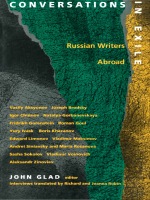
Glad's introduction situates the three distinct waves of westward emigration in their historical and political framework. Organized by genre, the book begins with discussions with the older generation of writers and then moves on to more recent arrivals: the makers of fantasy and humor, the aesthetes, the moralists, and the realists. Each voice is compelling for its invaluable testimony--some reveal startling insights into the persecution of dissidents under Soviet rule while others address the relationship between creativity, writing, and conditions of exile. Taken together these interviews reveal the range of modern Russian writing and document the personalities and positions that have made Russian writers in emigration so diverse, experimental, and controversial.
The Writers: Vasily Aksyonov, Joseph Brodsky, Igor Chinnov, Natalya Goranevskaya, Frifrikh Gorensetin, Roman Goul, Yury Ivask, Boris Khazanov, Edward Liminov, Vladimir Makisimov, Andrei Siniavsky and Maria Rozanova, Sasha Sokolov, Vladimir Voinovich, Aleksandr Zinoviev
Excerpt
John Glad: You're a Russian poet but an American essayist. Does that bring on any measure of split personality? Do you think you are becoming less and less Russian?
Joseph Brodsky (recipient of 1987 Nobel Prize for Literature): That's not for me to say. As far as I'm concerned, in my inner self, inside, it feels quite natural. I think being a Russian poet and an American essayist is an ideal situation. It's all a matter of whether you have (a) the heart and (b) the brains to be able to do both. Sometimes I think I do. Sometimes I think I don't. Sometimes I think that one interferes with the other.
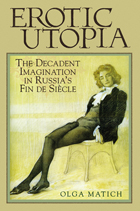
The first generation of Russian modernists experienced a profound sense of anxiety resulting from the belief that they were living in an age of decline. What made them unique was their utopian prescription for overcoming the inevitability of decline and death both by metaphysical and physical means. They intertwined their mystical erotic discourse with European degeneration theory and its obsession with the destabilization of gender. In Erotic Utopia, Olga Matich suggests that same-sex desire underlay their most radical utopian proposal of abolishing the traditional procreative family in favor of erotically induced abstinence.
“Offers a fresh perspective and a wealth of new information on early Russian modernism. . . . It is required reading for anyone interested in fin-de-siècle Russia and in the history of sexuality in general.”—Bernice Glatzer Rosenthal, Slavic and East European Journal
“Thoroughly entertaining.”—Avril Pyman, Slavic Review

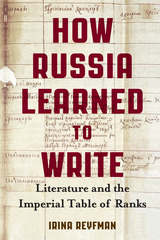
Irina Reyfman illuminates the surprisingly diverse effects of the Table of Ranks on writers, their work, and literary culture in Russia. From Sumarokov and Derzhavin in the eighteenth century through Pushkin, Gogol, Dostoevsky, and poets serving in the military in the nineteenth, state service affected the self-images of writers and the themes of their creative output. Reyfman also notes its effects on Russia’s atypical course in the professionalization and social status of literary work.
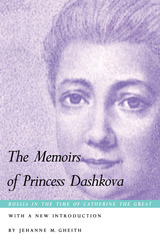
Originally written in French, first published in English, and long out of print, Dashkova’s Memoirs tell the story of a woman who at age eighteen played an important role in the coup that brought Catherine the Great to the throne. The relationship between these two women, often tense, is a central theme throughout this story. Dashkova, occupying the highly unusual position of both stateswoman and mother, also reveals her own path between the demands and limitations of the "private" and "public" spheres of her society. She provides a view of the expectations of Russian aristocratic women, the possibilities available to them, and the ways in which gender roles were conceived in the eighteenth century.
With a new introduction by Jehanne M Gheith, The Memoirs of Princess Dashkova will renew interest in the life of a fascinating woman for students of Russian history, women’s studies, and eighteenth-century studies. It will be a significant text for those engaged in the cross-cultural study of the traditions of women’s autobiographical writing.
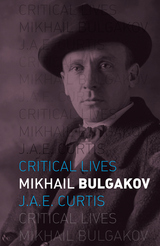
Exploring newly available archives that have opened up following the dissolution of the USSR, Curtis draws on new historical documents in order to trace Bulgakov’s life. She offers insights on his absolute determination to establish himself as a writer in Bolshevik Moscow, his three marriages and tumultuous personal life, and his triumphs as a dramatist in the 1920s. She also reveals how he struggled to defend his art and preserve his integrity in Russia under the close scrutiny of Stalin himself, who would personally weigh in each time on whether one of his plays should be permitted or banned. Based upon many years of research and examining previously little-known letters and diaries, this is an absorbing account of the life and work of one of Russia’s most inventive and exuberant novelists and playwrights.

One of the foremost Russian writers of the Soviet period, Mikhail Bulgakov (1891-1940) has attracted much critical attention. But Edythe Haber is the first to explore in depth his formative years, to probe the roots of his artistic vision. Her study yields a new picture of the novelist and playwright working in tumultuous times, and a fresh understanding of his ultimate masterpiece, The Master and Margarita.
Bulgakov as writer was born out of the chaos of the Russian revolution and civil war. Haber shows how he mines his civil war experience for literary purposes, and how he molds and remolds his protagonist, transforming the tormented intellectual of the earliest fiction into a complex solitary hero. In achieving in his fiction a version of the creative self, an autobiographical hero, Bulgakov redefines such traditional moral categories as courage and honor. Blending biography and literary analysis of motifs, story, and characterization, Haber tracks one writer's answer to the dislocations of revolution, civil war, and early Bolshevism. And from her examination of Bulgakov's satirical writings a vivid panorama emerges of the burgeoning Soviet society. These comic sketches and novellas, blending the fantastic and quotidian, evoke an intellectual's struggle with a hostile new world. In Haber's trenchant and broadly informed analysis we can see how the themes and characters of the early works receive their final permutation--and transcendence--in The Master and Margarita, surely the finest novel produced in Russia since the Revolution.

Mikhail Kuzmin (1872–1936), Russia’s first openly gay writer, stood at the epicenter of the turbulent cultural and social life of Petersburg-Petrograd-Leningrad for over three decades. A poet of the caliber of Aleksandr Blok, Vladimir Mayakovsky, Boris Pasternak, Osip Mandelshtam, and Marina Tsvetaeva (and acknowledged as such by them and other contemporaries), Kuzmin was also a prose writer, playwright, critic, translator, and composer who was associated with every aspect of modernism’s history in Russia, from Symbolism to the Leningrad avant-gardes of the 1920s.
Only now is Kuzmin beginning to emerge from the “official obscurity” imposed by the Soviet regime to assume his place as one of Russia’s greatest poets and one of this century’s most characteristic and colorful creative figures. This biography, the first in any language to be based on full and uncensored access to the writer’s private papers, including his notorious Diary, places Kuzmin in the context of his society and times and contributes to our discovery and appreciation of a fascinating period and of Russia’s long suppressed gay history.

This is a stunning achievement: an examination of all of Nikolai Leskov's fiction, exploring the relationship between his personality and his art, between his life experience and the form and content of his works. It is the first book-length study of Leskov in English and the most comprehensive in any language.
Leskov (1831–1895) is a major figure in the great tradition of nineteenth century Russian fiction. He was underestimated in his lifetime by Russian critics, partly for political reasons (in an age dominated by radicals he opposed revolution and stressed improvement of individual moral standards) and partly for literary ones (in an age of giant novels, his best work was in the shorter forms). Yet he remained popular among readers, and since his death his reputation has steadily risen, despite official Soviet disapproval of his religious interests and antiradical stance. Hugh McLean's biographical account and analysis of Leskov's novellas and stories place the writer in Russian social, intellectual, and religious history.

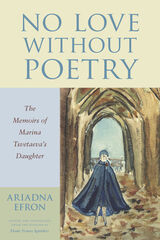
The memoirs of Ariadna Efron provide an intimate and indispensable perspective on the poet Marina Tsvetaeva’s life and work, told from the point of view of her daughter. This wrenching story about the difficulty of living with genius charts Efron’s relationship with her parents as they navigate art and exile.
Efron’s rapport with her mother, already intense, became strained under the hardships imposed by early twentieth century Russian political upheaval. Efron recounts the family’s travels from Moscow to Germany, to Czechoslovakia, and finally to France, where, against her mother’s advice, Efron decided to return to Russia. Diane Nemec Ignashev draws on Efron’s short stories and her mother’s notebooks to supplement the original memoirs. Haunting and poignant, No Love without Poetry completes extant historical records on Tsvetaeva—and showcases Efron as a literary force in her own right.
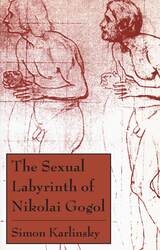
"A brilliant new biography that will long be prized for its illuminating psychological insights into Gogol's actions, its informative readings of his fiction and drama, and its own stylistic grace and vivacity."—Edmund White, Washington Post Book World
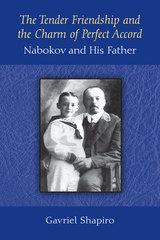
Vladimir Nabokov (1899–1977), a writer of world renown, grew up in a culturally refined family with diverse interests. Nabokov’s father, Vladimir Dmitrievich (1870–1922), was a distinguished jurist and statesman at the turn of the twentieth century. He was also a great connoisseur and aficionado of literature, painting, theater, and music as well as a passionate butterfly collector, keen chess player, and avid athlete. This book, the first of its kind, examines Vladimir Nabokov’s life and works as impacted by his distinguished father. It demonstrates that V. D. Nabokov exerted the most fundamental influence on his son, making this examination pivotal to understanding the writer’s personality and his world perception, as well as his literary, scholarly, and athletic accomplishments. The book contains never heretofore published archival materials. It is appended with rare articles by Nabokov and his father and is accompanied by old photographs. In addition, the book constitutes a survey of sorts of Russian civilization at the turn of the twentieth century by providing a partial view of the multifaceted picture of Imperial Russia in its twilight hours. The book illumines the historical background, political struggle, juridical battles, and literary and artistic life as well as athletic activities during the epoch, rich in cultural events and fraught with sociopolitical upheavals.
Cover illustration: Vladimir Nabokov and his father, 1906. The Nabokov family photographs. Copyright © The Estate of Vladimir Nabokov, used by permission of The Wylie Agency, LLC; and of The Henry W. and Albert A. Berg Collection of English and American Literature, The New York Public Library, Astor, Lenox and Tilden Foundations.

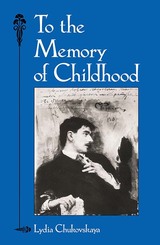
Her father is a household name in Russia because of his tales in verse for children. But his literary accomplishments ranged far beyond bedtime stories. As a critic he wrote controversial articles and lively profiles of cultural figures; as a translator he introduced Whitman, Twain, Kipling, and Wilde to Russian readers. When his children's literature was attacked in the 1920s and 1930s, he turned to editing, scholarship, and articles on translation. A man of boundless energy, he played a vital role in his country's cultural life until his death in 1969. "I am not writing Kornei Ivanovich's biography," Chukovskaya says, "but he was the author of my childhood."

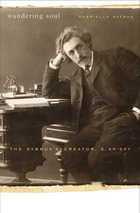
The man who would become S. An-sky—ethnographer, war correspondent, author of the best-known Yiddish play, The Dybbuk—was born Shloyme-Zanvl Rapoport in 1863, in Russia’s Pale of Settlement. His journey from the streets of Vitebsk to the center of modern Yiddish and Hebrew theater, by way of St. Petersburg, Paris, and war-torn Austria-Hungry, was both extraordinary and in some ways typical: Marc Chagall, another child of Vitebsk, would make a similar transit a generation later. Like Chagall, An-sky was loyal to multiple, conflicting Jewish, Russian, and European identities. And like Chagall, An-sky made his physical and cultural transience manifest as he drew on Jewish folk culture to create art that defied nationality.
Leaving Vitebsk at seventeen, An-sky forged a number of apparently contradictory paths. A witness to peasant poverty, pogroms, and war, he tried to rescue the vestiges of disappearing communities even while fighting for reform. A loner addicted to reinventing himself—at times a Russian laborer, a radical orator, a Jewish activist, an ethnographer of Hasidism, a wartime relief worker—An-sky saw himself as a savior of the people’s culture and its artifacts. What united the disparate strands of his life was his eagerness to speak to and for as many people as possible, regardless of their language or national origin.
In this first full-length biography in English, Gabriella Safran, using Russian, Yiddish, Hebrew, and French sources, recreates this neglected protean figure who, with his passions, struggles, and art, anticipated the complicated identities of the European Jews who would follow him.
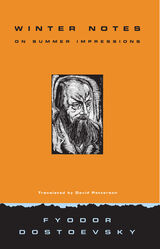
In June 1862, Dostoevsky left Petersburg on his first excursion to Western Europe. Ostensibly making the trip to consult Western specialists about his epilepsy, he also wished to see firsthand the source of the Western ideas he believed were corrupting Russia. Over the course of his journey he visited a number of major cities, including Berlin, Paris, London, Florence, Milan, and Vienna. He recorded his impressions in Winter Notes on Summer Impressions, which were first published in the February 1863 issue of Vremya (Time), the periodical of which he was the editor.
Among other themes, Dostoevsky reveals his Pan-Slavism, rejecting European culture as corrupt and exhorting Russians to resist the temptation to emulate or adopt European ways of life.
READERS
Browse our collection.
PUBLISHERS
See BiblioVault's publisher services.
STUDENT SERVICES
Files for college accessibility offices.
UChicago Accessibility Resources
home | accessibility | search | about | contact us
BiblioVault ® 2001 - 2024
The University of Chicago Press









